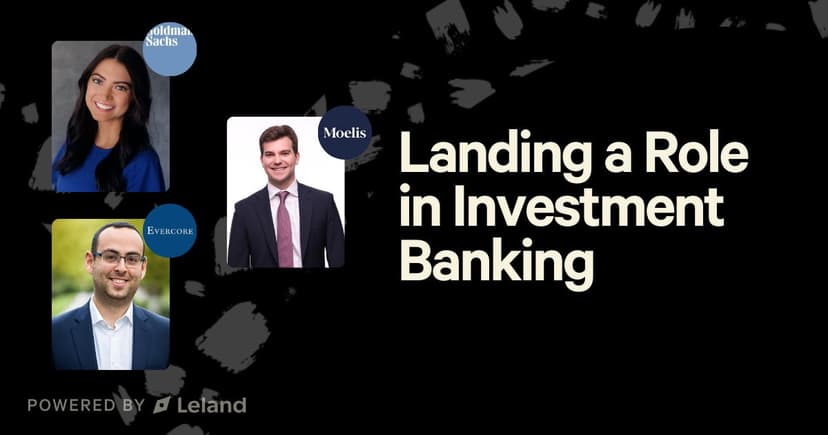IB Technical Interview Guide & Questions (With Sample Answers)
Master IB technicals with clear explanations, sample answers, and expert tips to ace your investment banking technical interview with confidence.
Posted August 15, 2025

Join a free event
Learn from top coaches and industry experts in live, interactive sessions you can join for free.
Table of Contents
The IB technical interview is one part of the investment banking application process. Bankers are required to have quantitative skills, as their main role involves helping their clients raise money, and this interview is a test of those skills. Most of the questions will revolve around valuation and accounting.
The firms want to see if you are able to think quickly on the spot, analyze problems effectively, and understand basic financial concepts.
What is an IB Technical Interview?
An IB (Investment Banking) technical interview is meant to see if you have the finance skills, valuation knowledge, and industry awareness needed to perform in an investment banking role. It is not just about memorizing definitions but also about showing you can take concepts like Discounted Cash Flow (DCF) analysis, comparable company analysis, or precedent transactions and apply them to real situations. You are expected to know your way around the three financial statements: the income statement, balance sheet, and cash flow statement, and explain how they connect. Interviews also often go beyond the numbers to test your understanding of M&A transactions, capital markets, and financial modeling, as well as your awareness of current market trends, recent deals, and major players in the industry.
You will likely face technical questions such as “How would you value a company?”, “What’s the difference between enterprise value and equity value?”, or “How do you calculate free cash flow from net income?” The best way to prepare is by mastering core finance concepts, practicing real and hypothetical valuation cases, staying up to date on market news, and building strong analytical skills through financial modeling exercises. The goal isn’t just to get the right answer. It is to show you can think like a banker and link financial theory to practical deal-making in a clear and confident way.
IB Interview Guide (Tips before your interview)
Build real relationships, not just “network”
Most top investment banking firms prioritize strong referrals, especially at the analyst and associate level. Cold applications rarely lead to interviews, but a thoughtful message to a current investment banker (ideally an alum or mutual connection) can open the door. Ask about their recent deals, how their team handles capital markets work, or how they built their financial modeling skills on the job.
Expert Tip: Mention a specific initial public offering or M&A transaction the firm was involved in. This shows genuine interest and a working understanding of their corporate finance focus.
Know exactly why you’re doing this
Generic answers like “I like finance” won’t cut it. When someone asks, “Why investment banking?”, speak clearly about what drives you, whether it’s the fast-paced nature of capital asset pricing model decisions, the strategic aspect of comparable companies analysis, or the challenge of valuing private companies with limited data.
Tailor your answer to the firm. Are you interested in a group that focuses on enterprise value creation in tech M&A, or one that leads precedent transaction analysis in healthcare? The more specific your answer, the more credible you’ll sound.
Expert Tip: Use the “past, present, future” method: how your background led you here, what you’ve done to prep (like a top investment banking course), and where you want to go.
Read: How to Nail Common Investment Banking Interview Question ("Why This Firm?")
Prioritize quality over quantity on your resume
One strong internship where you built a discounted cash flow analysis, forecasted future cash flows, or adjusted a client’s net working capital is more impressive than several filler roles. Interviewers want to see that you’ve applied core technical concepts like estimating the cost of equity, breaking down a company’s debt, or projecting free cash flow.
Be ready to speak fluently about interest payments, operating expenses, or why your model used present values instead of simple growth multiples. That depth is what sets candidates apart.
Expert Tip: For each experience, ask: Did I help value a company? Did I interpret financial statements? Did I get exposure to shareholders' equity, net income, or the company’s assets?
Read: Crafting the Perfect Investment Banking Resume: Best Practices
Show you're a strong teammate, not just a technical machine
Yes, you need to know the three financial statements cold. But banks hire people, not robots. At the end of the day, they want someone who can communicate clearly under pressure, contribute to a team, and not panic when a model breaks at 2 am. This is why culture fit and presence matter.
Don’t underestimate the importance of confidence, humility, and warmth. If your tone is too rehearsed or flat, you might not pass the “airport test.” Smile, engage, and speak like a future investment banking professional who belongs in the room.
Expert Tip: Practice walking through your resume and a sample deal out loud. Highlight the company’s capital structure, how you estimated equity value, and where you analyzed the cash flow statement or debt component.
Want a former banker to walk you through your story and drill you on technicals like net debt, interest expense, or terminal value? Book a mock interview with a top investment banking coach who’s worked at Goldman, Moelis, or Evercore. It’s the fastest way to get real feedback and improve.
20 Common Investment Banking Technical Interview Questions (and Sample Framing)
Here are the most frequently asked investment banking interview questions, with tips to structure your answers. Practice is the key, especially aloud.
1. What is the appropriate discount rate to use in an unlevered discounted cash flow analysis?
Sample Answer: For an unlevered DCF, I’d use the company’s Weighted Average Cost of Capital, or WACC. Since unlevered cash flows represent the money available to both debt and equity holders before interest payments, the discount rate needs to reflect the blended cost of all the capital providers. WACC captures that by weighting the cost of equity and the after-tax cost of debt based on the company’s capital structure.
2. How do you value a company?
Sample Answer: I wouldn’t rely on just one method. I’d look at a DCF to determine the intrinsic value based on the company’s projected cash flows. I’d also run a comparable company analysis to see how the market values similar businesses, and I’d check precedent transactions to understand what buyers have historically paid for similar companies. Putting these together gives me a valuation range that’s grounded in both intrinsic and market perspectives.
3. How would you value a company with negative historical cash flows?
Sample Answer: If historical cash flows are negative, I’d focus on forward-looking projections to see when the company is expected to turn cash flow positive. I might still run a DCF but start the model from the point it’s expected to generate positive cash, and I’d also rely more on revenue or user-based multiples from comparable companies, especially if it’s in a growth sector like tech or biotech. If the company has significant tangible or intangible assets, an asset-based valuation could also be relevant.
4. How do you calculate WACC?
Sample Answer: You calculate WACC by taking the percentage of equity in the capital structure, multiplying it by the cost of equity, then adding the percentage of debt multiplied by the after-tax cost of debt. Mathematically, that’s E over V times the cost of equity plus D over V times the cost of debt times one minus the tax rate, where E is equity, D is debt, and V is the total capital.
5. When would you use EBITDA vs. revenue multiples?
Sample Answer: EBITDA multiples are best when a company is profitable and you want to value it based on operating performance before non-cash and financing items. Revenue multiples make more sense when EBITDA is negative or volatile, which often happens with early-stage or high-growth companies that are reinvesting heavily and haven’t reached consistent profitability yet.
6. What is beta, and how do you calculate it?
Sample Answer: Beta measures how volatile a stock is compared to the overall market. A beta greater than one means it’s more volatile than the market; less than one means it’s less volatile. You can calculate beta by running a regression of the company’s stock returns against market returns. In practice, people often use an industry beta from comparable companies and adjust it for the company’s capital structure.
7. What is typically higher: the cost of equity or debt?
Sample Answer: The cost of equity is almost always higher because equity investors take on more risk. They’re last in line to be paid, and their returns aren’t guaranteed, so they demand a higher return than debt holders, who have contractual interest payments and priority in liquidation.
8. How do you calculate the cost of equity?
Sample Answer: The most common method is the Capital Asset Pricing Model, which is the risk-free rate plus beta multiplied by the market risk premium. It reflects the return equity investors expect for taking on the risk of holding the company’s stock compared to a risk-free investment.
10. What’s the appropriate numerator for a revenue multiple?
Sample Answer: You’d use Enterprise Value, because revenue is generated before interest payments. Enterprise Value accounts for the value attributable to both debt and equity holders, which aligns with the way revenue is earned.
11. Two companies have identical metrics. One trades at 7x P/E, the other at 12x. Which would you choose?
Sample Answer: On the surface, the one at 7x looks cheaper, but multiples are rarely the full story. If the two companies truly have the same growth, risk, and profitability profiles, the lower multiple is more attractive. But I’d want to understand why the market is assigning different multiples. There might be differences in risk, industry position, or upcoming events that explain the gap.
12. How do you calculate unlevered free cash flows
Sample Answer: You start with EBIT, multiply it by one minus the tax rate to get after-tax operating profit, then add back non-cash charges like depreciation, subtract changes in working capital, and subtract capital expenditures. The result is the cash flow available to all capital providers before any debt payments are made.
13. When should a company issue debt vs. equity?
Sample Answer: Debt makes sense when the company has stable cash flows, interest rates are favorable, and management wants to avoid diluting existing shareholders. Equity is better when the stock is trading at a strong valuation, cash flows are less predictable, or the company’s leverage is already high and additional debt would strain its balance sheet.
14. What are the three financial statements, and why are they important?
Sample Answer: The income statement shows a company’s profitability over time. The balance sheet provides a snapshot of what the company owns and owes at a given point. The cash flow statement explains how cash moves into and out of the business. Together, they give you a full picture of financial health and performance.
15. How are the income statement and balance sheet connected?
Sample Answer: Net income from the income statement flows into retained earnings on the balance sheet. Also, many changes on the balance sheet, like accounts receivable or accounts payable, originate from items recorded on the income statement.
16. How would you value a company in an unfamiliar industry?
Sample Answer: I’d start with industry research to understand key drivers, trends, and metrics. Then I’d identify the most relevant comparable companies in that space and use their trading multiples as a benchmark. I’d also speak with industry experts if possible, to make sure my assumptions are realistic before attempting a DCF or other valuation method.
17. What are some recent market trends?
Sample Answer: This depends on timing, but you should be ready with specifics. For example, you could talk about changes in interest rates, shifts in M&A activity, private credit growth, or a rebound in the IPO market. The key is to be current and relevant to the role.
18. If depreciation increases by $200, how do all statements change?
Sample Answer: On the income statement, EBIT falls by $200. Taxes are reduced by $200 times the tax rate, and net income falls by $200 times one minus the tax rate. On the cash flow statement, you add back the $200 depreciation because it’s non-cash, so operating cash flow increases by the tax savings. On the balance sheet, PP&E decreases by $200, cash increases by the amount of the tax shield, and retained earnings decrease by the drop in net income.
19. What does a negative enterprise value imply?
Sample Answer: It usually means the company has more cash than the value of its equity plus debt. This can happen with distressed companies whose equity is very low or with businesses holding unusually large cash balances compared to their market capitalization.
20. What is an accretion/dilution analysis?
Sample Answer: It’s an analysis that compares a buyer’s earnings per share before and after an acquisition to see if the deal is accretive or dilutive. If EPS goes up, it’s accretive; if it goes down, it’s dilutive. You account for the purchase price, financing method, and any expected synergies to determine the impact.
Behavioral Questions You Should Also Nail
Why investment banking?
Sample Answer: I’m drawn to investment banking because it blends financial modeling and valuation with real market impact. My background includes working with the three financial statements, running discounted cash flow analysis, and linking equity value and enterprise value to a company’s cash flows. I enjoy applying technical concepts like WACC, cost of equity, and cost of debt to real deal discussions, and IB offers the chance to do that at the highest level.
Why this firm?
Sample Answer: This firm stands out for its strong deal flow across public and private companies, and the way analysts get hands-on with valuation, market comps, and free cash flow analysis from day one. I value the culture of mentorship and the opportunity to work on transactions involving complex capital structures, where both debt and equity strategies play a role.
Could you walk me through your resume?
Sample Answer: I built my foundation in accounting and finance, learning how the income statement, balance sheet, and cash flow statement connect through items like accounts receivable, capital expenditures, and retained earnings. I’ve applied this in DCF models, comparable companies analysis, and net debt calculations, developing the technical knowledge and client-focused mindset that invest banking the right next step.
Read: Time Management in Investment Banking Interviews: How to Prioritize Your Answers
Top 10 Free Investment Banking Resources
- Resume - Zety IB Resume Guide
- Questions - Wall Street Prep Top IB Questions
- Accounting - CFI Accounting Course
- Excel - CFI Excel Fundamentals
- Market - EDX Fixed Income Course
- Pitchbooks - Udemy IB Pitchbook Course
- Stock Market - Udemy Investing Basics
- Templates - Macabacus Financial Model Template
- Videos - Skillshare IB Classes
- Library - Wall Street Mojo IB Resources
The Bottom Line
Cracking the IB technical interview is not just about memorizing answers but about truly understanding the concepts so you can apply them on the spot. The best candidates can walk through a Discounted Cash Flow (DCF) or comparable company analysis, explain how the three financial statements connect, and show how changes in things like net income, Weighted Average Cost of Capital (WACC), or capital expenditures impact a company’s value. They know how to tie numbers to real-world deal situations, whether that’s breaking down enterprise value vs. equity value or discussing the mechanics of an M&A transaction.
To stand out, focus on building a solid grasp of finance and accounting fundamentals, practice delivering your answers out loud, and stay up to date on market trends and recent deals. Pair those technical skills with clear communication, genuine enthusiasm for the work, and the kind of presence that makes you someone a team would trust in high-pressure situations. That’s the combination that turns strong preparation into a real offer
Leland provides you with the content, community, and coaching that you need to build your dream investment banking career and accomplish other ambitious goals. Sign up today to gain access to additional free resources, community events, small group classes, world-class coaching, and more.
Expert Guidance for Acing Your Investment Banking Interviews
Applying for investment banking interviews can be daunting, but have no fear because Leland is here! Read these articles for more free tips and tricks as you navigate the IB interview process. Here are several of our expert investment banking coaches who can help with any part of the application, recruiting, and hiring processes. See our full list of world-class IB coaches here.
Read these next:
- An Expert’s Guide to Resumes: Five Tips to Make You Stand Out
- How to Answer “Why This Firm?” and “Why Investment Banking?” in Interviews
- How to Break Into Investment Banking–What to Do From Freshman to Senior Year
- The Best MBA Programs for Investment Banking
- How to Answer “Why This Firm?” and “Why Investment Banking?” in Interviews
- Investment Banking Technical Interview Questions & Answers
FAQs
What are technicals in IB?
- Technicals in investment banking refer to the finance, accounting, and valuation concepts tested in interviews to see if you can handle the analytical side of the job. This includes topics like the three financial statements, discounted cash flow analysis, comparable companies, precedent transactions, enterprise value vs. equity value, and financial modeling.
How long does it take to prep for IB technicals?
- Most candidates spend 2–3 months preparing for IB technicals if they start with a solid finance background, and 4–6 months if they’re newer to the material. Preparation usually involves studying interview guides, practicing valuation and modeling exercises, and running through mock interviews.
Is a 3.7 GPA good enough for investment banking?
- Yes, a 3.7 GPA is generally strong for investment banking and will keep you competitive for interviews at most firms. That said, GPA is only one factor; networking, internships, and interview performance also play a big role.
Is investment banking technically hard?
- It can be, because the role demands a strong grasp of finance, accounting, valuation, and modeling under time pressure. However, with consistent preparation and practice, most candidates can learn the technical skills needed to succeed.

























